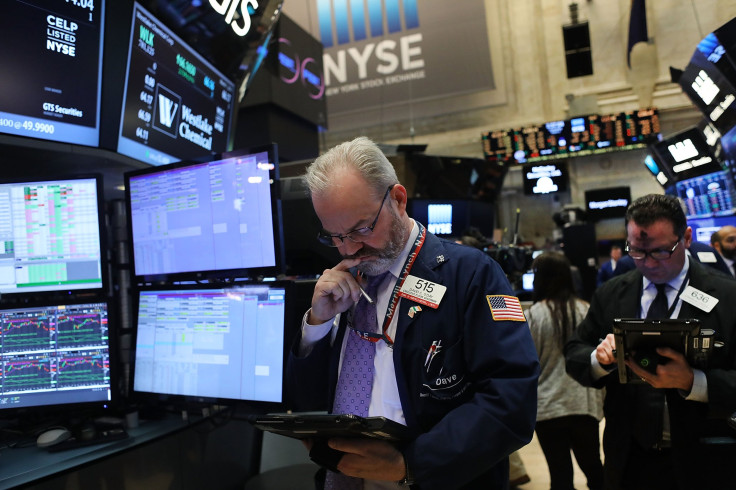Trump Economy Prediction: Will President's Economic Plan Cause A Stock Market Crash? What Warren Buffett Has Said About 2017 Markets

President Donald Trump has yet to unveil his tax plan but most experts have an idea of what to expect: A simplified tax code which lowers the top tax rate from over 39 percent to 33 percent along with the slashing of corporate taxes from 35 percent to 20 percent. To little surprise, economists believe the main beneficiaries of the Trump plan will be the richest 1 percent, which may expect to receive an average annual tax cut of $214,000, and adversely affect an economy that has made strides since the Great Recession of 2008.
Massive corporate tax cuts, which could be cut to as low as 15 percent, would almost certainly be a boon for multinational companies.
Trump's plan, which is expected to be unveiled in March, could be worth $27 billion to legendary Wall Street investor Warren Buffett, one of the richest men in the world. A top insurance industry analyst with Barclays wrote in a note to clients last week that Buffett's conglomerate holding company, Berkshire Hathaway (BRK-A, BRK-B), stands to benefit greatly from a corporate rate cut.
“Based on updated financial data as of [year-end 2016], Berkshire Hathaway’s book value could be boosted by $27 billion (10 percent increase) if the U.S. corporate tax rate were reduced to 20 percent due to a decline in its deferred tax liability,” wrote Jay Gelb, who follows Berkshire Hathaway.
While conglomerate holding companies stand to benefit from Trump's tax plan, major Wall Street indexes contine to perform well. Markets have reached record highs in recent months and analysts think the rally will continue for at least the next six months. The recent results might surprise some since Trump's plans, like rolling back financial regulations, could perhaps undo the markets' sharp gains that occurred under the Obama administration.
Buffett, who supported Barack Obama and Hillary Clinton, has been making bullish comments on the markets for quite some time and Berkshire's price of shares has seen solid gains. But he doesn't equate markets success with who is in the White House. In May 2016, Buffett said Berkshire "will continue to do fine" with either Trump or Clinton as president.
In an appearance on CNBC on Feb. 27, Buffett said he has "bought a lot of stock in the last four months," with Berkshire spending about $20 billion on stocks since just before the U.S. election. Buffett has cited "innovation, productivity gains, entrepreneurial spirit and an abundance of capital," for his optimism in Berkshire Hathaway's annual shareholder letter last week.
"American business — and consequently a basket of stocks — is virtually certain to be worth far more in the years ahead," Buffett said.
"Investors who avoid high and unnecessary costs and simply sit for an extended period with a collection of large, conservatively financed American businesses will almost certainly do well."
But while Buffett and many Wall Street analysts are pleased with the market's health, many respected U.S. economists remain skeptical about the Trump economy and the president's tax plan, and how it may negatively affect Wall Street. Robert Shiller, a Nobel Prize winner and a professor of economics at Yale University, drew similarities between Trump and Calvin Coolidge, who was president at the time of a big bull market that went bust in the 1920s.
“The U.S. economy during the Coolidge administration was very successful, but the boom ended badly in 1929, just after Coolidge stepped down, with the stock market crash and the beginning of the Great Depression,” Shiller wrote in a column for the Guardian.
Shiller, who had warned of the potential of a stock market crash in a June 2015 interview, thinks the bull market can continue but might be short-lived.
“I think there will be a Trump boom for a while. Stocks look high, but they are not yet super-high. In 2000, the (Cape Shiller) price-earnings ratio was over 45 [just before the dot-com bust] and we may see a repeat of that,” Shiller told the Telegraph in January. He later added he fears "things could turn very bad for the markets."
New York Times columnist Paul Krugman, also a Nobel Prize winner in economics, presented a gloom-and-doom prospect for the stock market immediately after the election and in February reaffirmed his warnings of the harmful effects of tax cuts and deregulation.
While a stock market crash seems unlikely anytime soon, according to Wall Street experts, a "correction," which involves a market decline of at least 10 percent, might be looming this year.
"I think there's a good chance people have too optimistic expectations for 2017," Tom Lee, co-founder of Fundstrat Global Advisors, said on CNBC's "Squawk Box" in December.
"If I was an investor and I was in cash, I wouldn't try to time the market to make the best return in the next 12 months. It wouldn't be a surprise if we had a 10 percent pullback [in 2017]."
© Copyright IBTimes 2024. All rights reserved.












